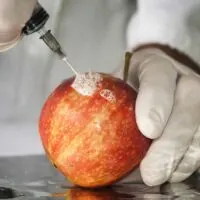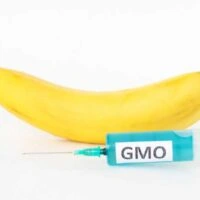Genetically Engineered Apples: What You Need to Know
In February 2015, just two weeks after the approval of the world’s first genetically engineered apple, the company responsible for its creation cashed in — to the tune of $41 million dollars, all for a highly controversial product that faced significant public opposition.
Okanagan Specialty Fruits, the company behind this genetically engineered “non-browning” apple, faced protests and petitions before finally getting approval from the FDA. Despite the controversy, the FDA granted the green light without requiring independent pre-market safety testing or feeding trials.
In 2017, three different GMO apples, along with pre-sliced apple packages, made their way to store shelves, albeit in small quantities. With no GMO labeling and little to distinguish these apples from natural ones, consumers are left unaware of what they’re buying.
But First, What does GMO really mean?
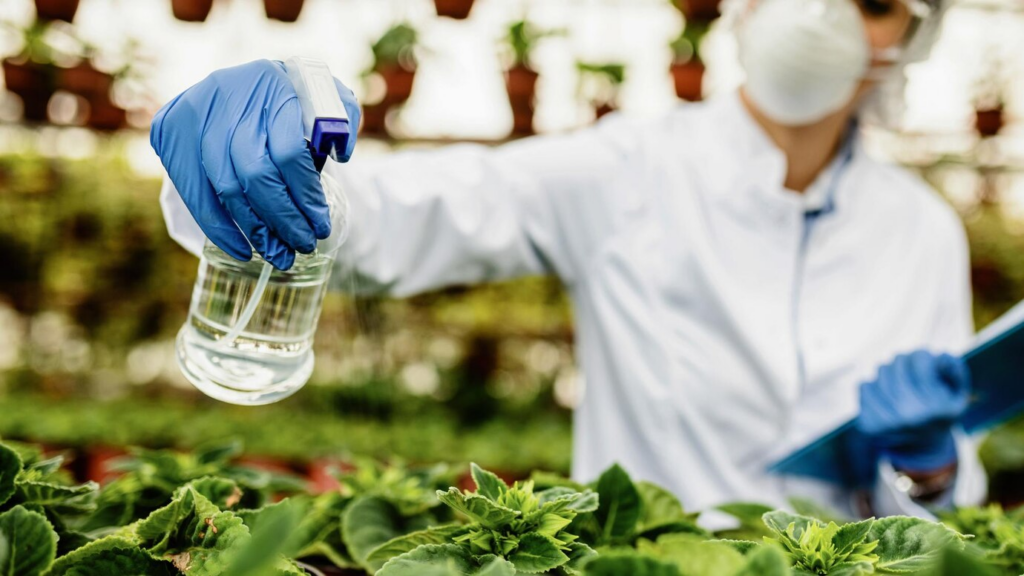
Genetically Modified Organisms (GMOs) are organisms whose genetic material has been artificially altered using genetic engineering techniques. In agriculture, GMOs are often plants modified to resist pests, tolerate herbicides, or enhance nutritional content.
The process involves isolating a gene responsible for a desired trait in one organism and inserting it into another. This is done using techniques like bacterial infection or electric currents to introduce the new DNA into the cells. Once integrated, the modified plant expresses the new trait as it grows.
Despite the science, concerns persist about the impact of GMOs on human health, which we will explore below.
Concerns Surrounding GMOs
Despite the potential benefits, the integration of GMOs into our food system has raised several concerns:
- Lack of Long-Term Studies: While short-term studies suggest GMOs are safe for consumption, the absence of long-term research leaves questions about their potential health impacts.
- Allergic Reactions: Introducing foreign genes into plants may trigger new allergens or allergic reactions in susceptible individuals, especially if genes from allergenic plants are used.
- Gene Transfer: Though unlikely, there’s concern that inserted genes could transfer to human cells or gut bacteria, with uncertain health implications.
- Unintended Consequences: Genetic modifications could unintentionally affect the nutritional content or introduce harmful compounds, raising potential health risks.
Back To Apples – Pre-Sliced Apples Hit Stores in 2017
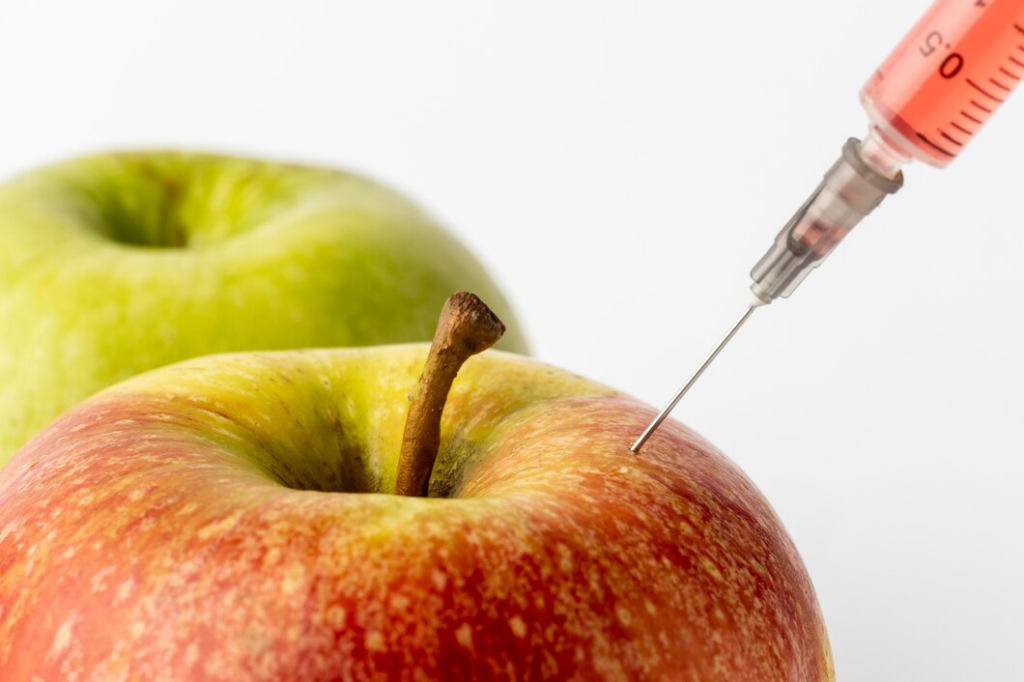
As noted by recent news reports including this one by CNN.com, a small amount of Golden Delicious apples that have been genetically engineered by Okanagan were expected to hit 10 stores in the Midwest in early 2017, ranging from February through March.
Since the report, no new information has surfaced on where the GMO apples ended up, which is just part of the frustration with the new GMO apples — they are not labeled as being GMO, and the company itself declined to mention which stores they were headed to for in 2017. The apples were labeled only with the ‘Arctic’ apple name, but consumers who presumably bought them likely had no idea they were genetically modified in a laboratory to be “non-browning.”
The lack of traceability and accountability is just part of the reason why the apples have been widely opposed in consumer polls; nearly 70% of Canadians did not want it approved.
Still, biotech companies have been promoting the GMO apple across Canada as of March 2017, in order to sway public opinion, much the same way that Monsanto and other biotech companies have donated money to schools for pro-GMO, heavily biased “educational” programs.
Three New Untested and Unlabeled GMO Apples
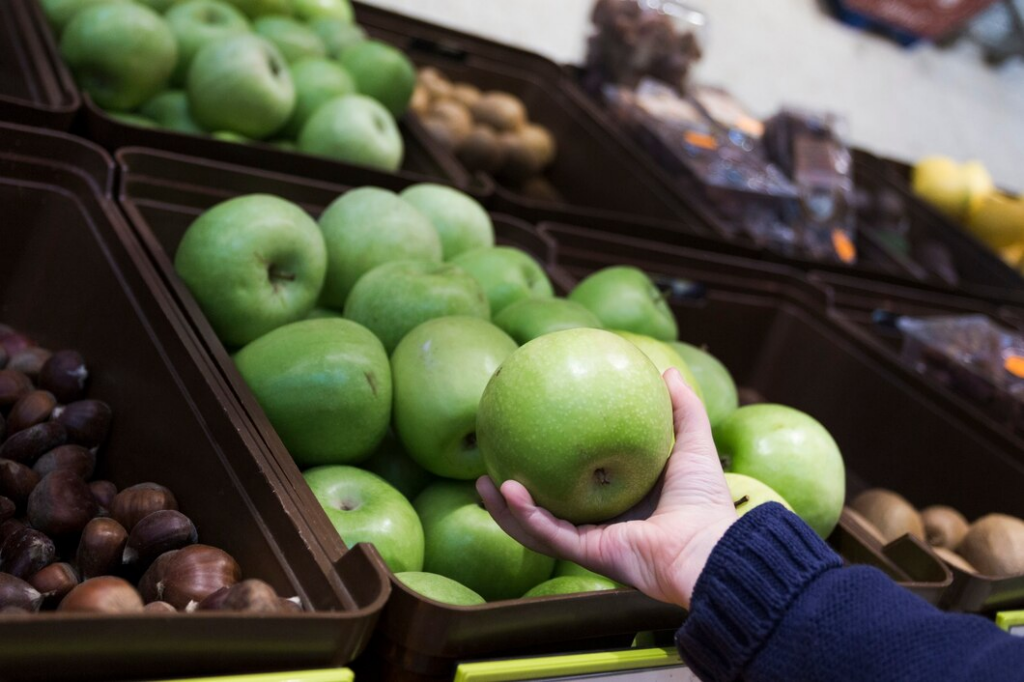
By fall 2016, a new genetically engineered Fuji apple had been approved by the USDA, joining the Arctic Golden and Arctic Granny Smith apples. These non-browning apples, while promoted for their convenience, raised concerns due to the lack of safety testing and labeling.
Consumers have expressed worry that these apples could mask signs of spoilage, leading people to unknowingly eat rotting produce. The Organic Consumers Association responded by launching a campaign urging companies not to use these GMO apples, with several major brands, including McDonald’s, Wendy’s, and Gerber, pledging to avoid them.
How to Avoid GMO Apples
According to the Ag publication CapitalPress.com, about 1,000 to 1,200, 40-pound boxes of Arctic Golden GMO apples were expected to be sliced and sold in grocery stores for marketing purposes in the western U.S. this past fall.
The company is growing most of its own apples in the Pacific Northwest, on the East Coast, and in Canada, and also recently just hired more staff in order to gear up for a commercial launch and PR campaign for more non-browning GMO apples in fall 2017.
Retailers, food service and quick-serve restaurants have all expressed interest in using the GMO apples according to the CapitalPress report, which means that people eating out may unwillingly become test subjects.
In order to make sure you’re avoiding the new GMO apples, here’s what you must do:
- Buy certified organic or Non-GMO Project Verified whenever possible, or from a trusted local farmer
- Do not buy any apples labeled ‘Arctic,’ which may be designated with a sticker or special packaging
- Avoid buying any unlabeled or unknown pre-sliced apple brands, like those found in cafeterias or kids’ meals
- Ask your local restaurants or cafes for information, and ask them NOT to carry to the new GMO non-browning apples
Even Apple Growers Nationwide Don’t Want GMOs
Fearing that the new unlabeled GMO apples could hurt their iconic crop’s image and lead to more consumer rejection and confusion (as well as crop contamination), many of the top apple industry players have already come out against them.
They include the Northwest Horticultural Council, which represents Washington apple growers responsible for over 60% of the U.S. crop, the U.S. Apple Association, and the British Columbia Fruit Growers Association. While the non-browning apple may be a boon for processed food giants and restaurants or cafes that want to save a buck on the non-browning aspect of these apples, the effects on human health are unknown, and avoiding it may prove to be exceedingly difficult over time if they are allowed to flow through the food supply unchecked.
“As usual, this product only benefits the biotech industry and big food processing companies,” wrote The Center for Food Safety on a petition page designed to get more food companies on board with boycotting the new GE apples.
Human Health Concerns and Unlabeled GMO Apples
The non-browning trait in these GMO apples is achieved by “silencing” the gene responsible for browning. While this may seem like a useful characteristic, it raises questions about the long-term effects of consuming modified apples. The lack of safety testing and feeding trials has left consumers as unwitting participants in an experiment, with potential health risks yet unknown.
Several organizations, including the Organic Consumers Association, have launched campaigns to prevent the use of these unlabeled GMO apples. Major companies such as McDonald’s, Wendy’s, and Gerber have already pledged not to use them. However, the primary market for these apples is expected to be restaurants and food service companies looking to pass off expired or substandard apples as fresh and healthy, potentially jeopardizing consumer health.
Making Informed Choices
When it comes to genetically engineered apples, consumers have the right to make informed choices about the food they consume. The lack of labeling and transparency surrounding GMO apples raises valid concerns about the potential health risks and consumer deception. As individuals, we can make a difference by supporting certified organic or Non-GMO Project Verified apples and urging local restaurants and cafes to avoid stocking the new GMO non-browning varieties. By staying informed and taking action, we can protect our health and support sustainable, transparent food systems.

